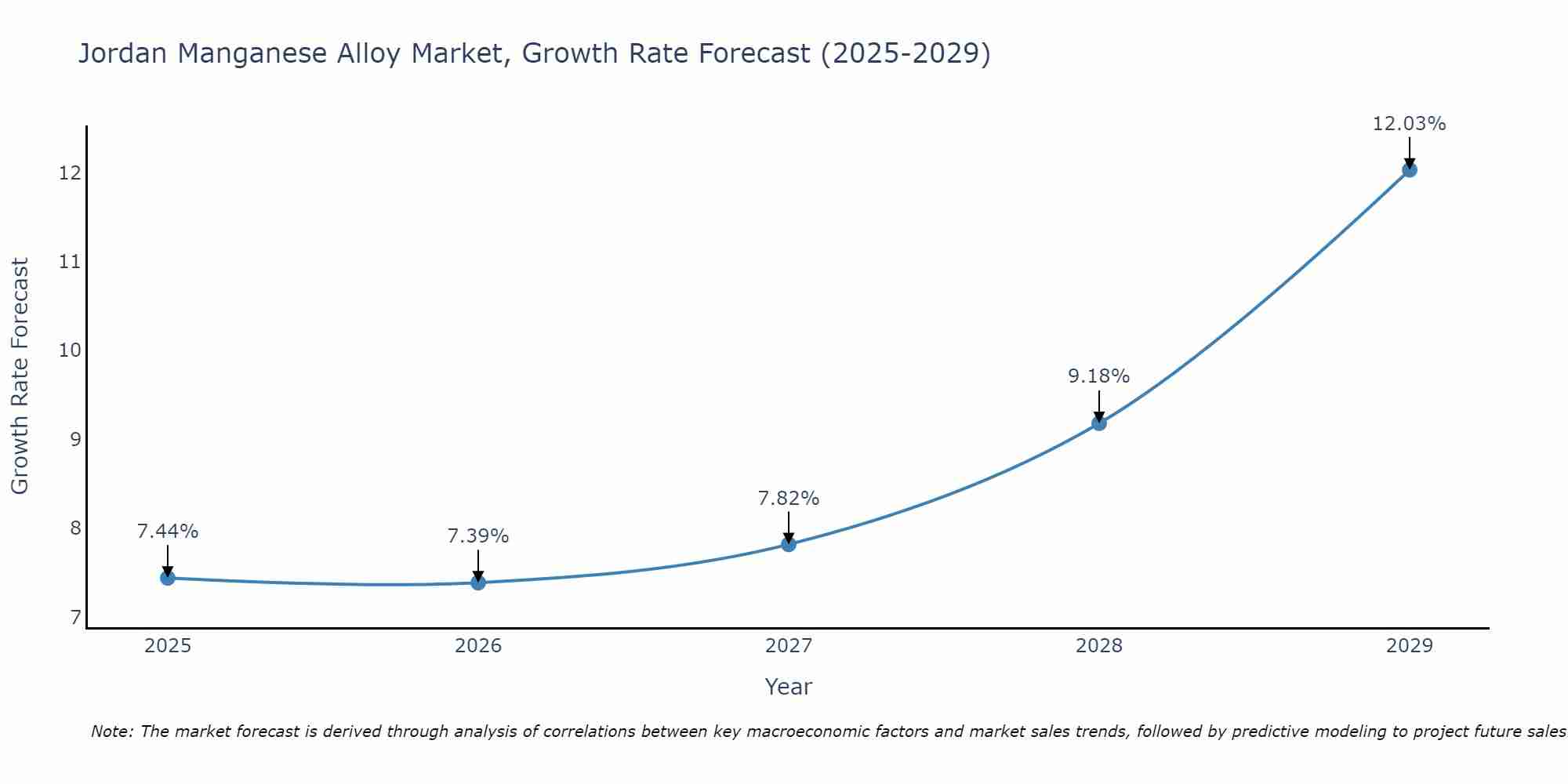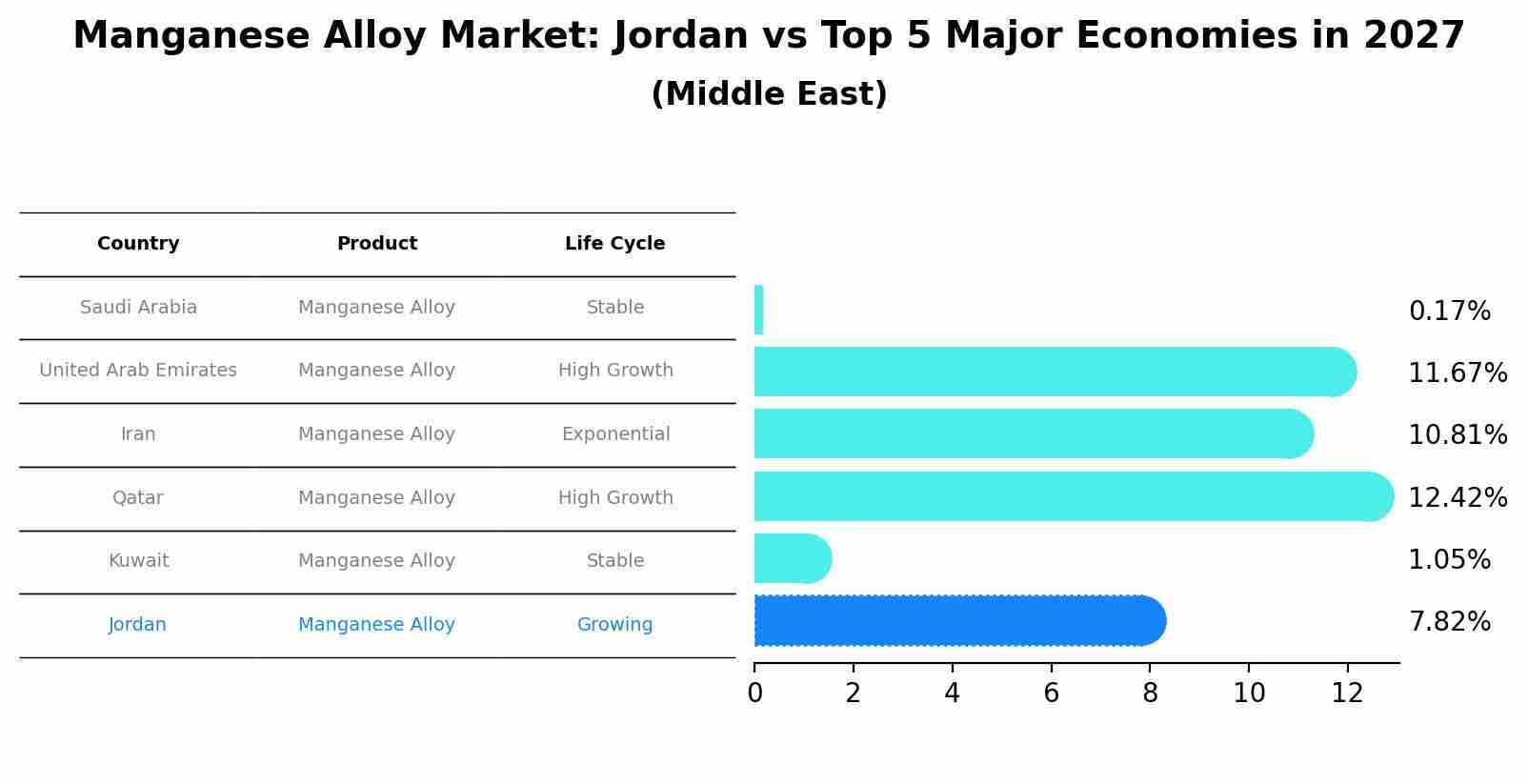Jordan Manganese Alloy Market (2025-2031) Outlook | Industry, Revenue, Size, Value, Share, Analysis, Forecast, Companies, Trends & Growth
| Product Code: ETC091865 | Publication Date: Jun 2021 | Updated Date: Jun 2025 | Product Type: Report | |
| Publisher: 6Wresearch | Author: Dhaval Chaurasia | No. of Pages: 70 | No. of Figures: 35 | No. of Tables: 5 |
Jordan Manganese Alloy Market Size Growth Rate
The Jordan Manganese Alloy Market is projected to witness mixed growth rate patterns during 2025 to 2029. From 7.44% in 2025, the growth rate steadily ascends to 12.03% in 2029.

Manganese Alloy Market: Jordan vs Top 5 Major Economies in 2027 (Middle East)
By 2027, the Manganese Alloy market in Jordan is anticipated to reach a growth rate of 7.82%, as part of an increasingly competitive Middle East region, where Saudi Arabia remains at the forefront, supported by United Arab Emirates, Iran, Qatar and Kuwait, driving innovations and market adoption across sectors.

Jordan Manganese Alloy Market Overview
The Jordan Manganese Alloy Market is experiencing steady growth driven by increasing demand from the steel industry. Manganese alloys play a crucial role in steel production as they enhance the properties of steel, such as strength, durability, and resistance to corrosion. Jordan benefits from abundant manganese ore reserves, which support the local production of manganese alloys. The market is also influenced by global trends in steel production, infrastructure development, and industrial growth. Key players in the Jordanian market include producers of ferromanganese and silicomanganese alloys, catering to both domestic and export markets. With ongoing investments in infrastructure and industrial projects, the Jordan Manganese Alloy Market is expected to continue its growth trajectory in the coming years, presenting opportunities for further expansion and development within the sector.
Jordan Manganese Alloy Market Trends
The Jordan Manganese Alloy Market is currently experiencing a trend towards increasing demand due to the growing infrastructure developments and industrial activities in the region. The market is witnessing a shift towards higher manganese content alloys to meet the stringent quality requirements of steel production. Additionally, there is a focus on sustainable practices and environmental regulations, leading to the development of eco-friendly manganese alloy products. Market players are also investing in research and development to enhance product quality and expand their product portfolios. Overall, the Jordan Manganese Alloy Market is poised for growth driven by the rising demand for steel products and the continuous efforts towards innovation and sustainability.
Jordan Manganese Alloy Market Challenges
The Jordan Manganese Alloy Market faces several challenges, including fluctuating global demand and prices for manganese, competition from other manganese alloy producers in the region, limited access to high-quality manganese ore reserves, regulatory constraints, and infrastructure limitations. Additionally, the market may also be impacted by geopolitical instability in the region, which can disrupt supply chains and hinder business operations. To navigate these challenges successfully, companies in the Jordan Manganese Alloy Market need to focus on enhancing operational efficiency, investing in technology and innovation, building strategic partnerships, and diversifying their product offerings to remain competitive in the global market.
Jordan Manganese Alloy Market Investment Opportunities
The Jordan Manganese Alloy Market presents several investment opportunities due to the growing demand for manganese alloys in various industries such as steel production, construction, and automotive manufacturing. Investing in manganese alloy production companies in Jordan could be lucrative, as the country has significant manganese reserves and a strategic location for exports to regional markets. Additionally, with the increasing focus on sustainable and environmentally friendly practices, investing in companies that specialize in producing eco-friendly manganese alloys could provide long-term growth potential. Furthermore, partnering with local mining companies to develop efficient extraction and processing technologies could also be a promising investment avenue in the Jordan Manganese Alloy Market.
Jordan Manganese Alloy Market Government Policy
The Jordanian government has implemented various policies to regulate the manganese alloy market in the country. These include the Mining Law, which governs the extraction and export of manganese ore, as well as the Industrial Development Law, which aims to promote the growth of the manganese alloy industry through incentives and support for local production. Additionally, the government has established the Jordan Investment Commission to attract foreign investment in the sector and enhance competitiveness. Environmental regulations are also in place to ensure sustainable mining practices and minimize the impact on the environment. Overall, these policies demonstrate the government`s commitment to developing and regulating the manganese alloy market in Jordan while promoting economic growth and sustainability.
Jordan Manganese Alloy Market Future Outlook
The future outlook for the Jordan Manganese Alloy Market appears promising due to several factors. Jordan`s strategic location and well-established mining industry provide a competitive advantage for the production and export of manganese alloys. With the increasing demand for steel in various industries such as construction, automotive, and infrastructure development, the demand for manganese alloys is expected to grow steadily. Additionally, ongoing technological advancements in the mining and production processes are likely to further enhance the efficiency and quality of manganese alloy production in Jordan. Furthermore, the government`s support for the mining sector and initiatives to attract foreign investments are anticipated to drive the market growth in the coming years. Overall, the Jordan Manganese Alloy Market is poised for expansion and presents opportunities for both domestic and international players.
Key Highlights of the Report:
- Jordan Manganese Alloy Market Outlook
- Market Size of Jordan Manganese Alloy Market, 2021
- Forecast of Jordan Manganese Alloy Market, 2031
- Historical Data and Forecast of Jordan Manganese Alloy Revenues & Volume for the Period 2021 - 2031
- Jordan Manganese Alloy Market Trend Evolution
- Jordan Manganese Alloy Market Drivers and Challenges
- Jordan Manganese Alloy Price Trends
- Jordan Manganese Alloy Porter's Five Forces
- Jordan Manganese Alloy Industry Life Cycle
- Historical Data and Forecast of Jordan Manganese Alloy Market Revenues & Volume By Type for the Period 2021 - 2031
- Historical Data and Forecast of Jordan Manganese Alloy Market Revenues & Volume By Ferro-Manganese for the Period 2021 - 2031
- Historical Data and Forecast of Jordan Manganese Alloy Market Revenues & Volume By Metallic Manganese for the Period 2021 - 2031
- Historical Data and Forecast of Jordan Manganese Alloy Market Revenues & Volume By Nickel-Manganese Alloy for the Period 2021 - 2031
- Historical Data and Forecast of Jordan Manganese Alloy Market Revenues & Volume By Nitrided Manganese Alloy for the Period 2021 - 2031
- Historical Data and Forecast of Jordan Manganese Alloy Market Revenues & Volume By Silico-Manganese for the Period 2021 - 2031
- Historical Data and Forecast of Jordan Manganese Alloy Market Revenues & Volume By Iron-Manganese Alloys for the Period 2021 - 2031
- Historical Data and Forecast of Jordan Manganese Alloy Market Revenues & Volume By Application for the Period 2021 - 2031
- Historical Data and Forecast of Jordan Manganese Alloy Market Revenues & Volume By Foundry for the Period 2021 - 2031
- Historical Data and Forecast of Jordan Manganese Alloy Market Revenues & Volume By Steel for the Period 2021 - 2031
- Historical Data and Forecast of Jordan Manganese Alloy Market Revenues & Volume By Superalloys for the Period 2021 - 2031
- Historical Data and Forecast of Jordan Manganese Alloy Market Revenues & Volume By Welding Electrodes for the Period 2021 - 2031
- Historical Data and Forecast of Jordan Manganese Alloy Market Revenues & Volume By End-users for the Period 2021 - 2031
- Historical Data and Forecast of Jordan Manganese Alloy Market Revenues & Volume By Medical for the Period 2021 - 2031
- Historical Data and Forecast of Jordan Manganese Alloy Market Revenues & Volume By Mining Industry for the Period 2021 - 2031
- Historical Data and Forecast of Jordan Manganese Alloy Market Revenues & Volume By Chemical Industry for the Period 2021 - 2031
- Historical Data and Forecast of Jordan Manganese Alloy Market Revenues & Volume By Machinery Manufacturing Industry for the Period 2021 - 2031
- Jordan Manganese Alloy Import Export Trade Statistics
- Market Opportunity Assessment By Type
- Market Opportunity Assessment By Application
- Market Opportunity Assessment By End-users
- Jordan Manganese Alloy Top Companies Market Share
- Jordan Manganese Alloy Competitive Benchmarking By Technical and Operational Parameters
- Jordan Manganese Alloy Company Profiles
- Jordan Manganese Alloy Key Strategic Recommendations
Frequently Asked Questions About the Market Study (FAQs):
- Single User License$ 1,995
- Department License$ 2,400
- Site License$ 3,120
- Global License$ 3,795
Search
Related Reports
- Australia IT Asset Disposal Market (2025-2031) | Strategy, Consumer Insights, Analysis, Investment Trends, Opportunities, Growth, Size, Share, Industry, Revenue, Segments, Value, Segmentation, Supply, Forecast, Restraints, Outlook, Competition, Drivers, Trends, Demand, Pricing Analysis, Competitive, Strategic Insights, Companies, Challenges
- UAE Building Thermal Insulation Market Outlook (2025-2031) | Revenue, Companies, Share, Trends, Growth, Size, Forecast, Industry, Analysis & Value
- Portugal Electronic Document Management Market (2025-2031) | Strategy, Consumer Insights, Analysis, Investment Trends, Opportunities, Growth, Size, Share, Industry, Revenue, Segments, Value, Segmentation, Supply, Forecast, Restraints, Outlook, Competition, Drivers, Trends, Demand, Pricing Analysis, Competitive, Strategic Insights, Companies, Challenges
- France Electronic Document Management Market (2025-2031) | Strategy, Consumer Insights, Analysis, Investment Trends, Opportunities, Growth, Size, Share, Industry, Revenue, Segments, Value, Segmentation, Supply, Forecast, Restraints, Outlook, Competition, Drivers, Trends, Demand, Pricing Analysis, Competitive, Strategic Insights, Companies, Challenges
- Portugal Occupational Health & Safety Services Market (2025-2031) | Strategy, Consumer Insights, Analysis, Investment Trends, Opportunities, Growth, Size, Share, Industry, Revenue, Segments, Value, Segmentation, Supply, Forecast, Restraints, Outlook, Competition, Drivers, Trends, Demand, Pricing Analysis, Competitive, Strategic Insights, Companies, Challenges
- Netherlands Occupational Health and Safety Services Market (2025-2031) | Strategy, Consumer Insights, Analysis, Investment Trends, Opportunities, Growth, Size, Share, Industry, Revenue, Segments, Value, Segmentation, Supply, Forecast, Restraints, Outlook, Competition, Drivers, Trends, Demand, Pricing Analysis, Competitive, Strategic Insights, Companies, Challenges
- Belgium and Luxembourg Facility Management Market (2025-2031) | Strategy, Consumer Insights, Analysis, Investment Trends, Opportunities, Growth, Size, Share, Industry, Revenue, Segments, Value, Segmentation, Supply, Forecast, Restraints, Outlook, Competition, Drivers, Trends, Demand, Pricing Analysis, Competitive, Strategic Insights, Companies, Challenges
- Russia Women Intimate Apparel Market (2025-2031) | Strategy, Consumer Insights, Analysis, Investment Trends, Opportunities, Growth, Size, Share, Industry, Revenue, Segments, Value, Segmentation, Supply, Forecast, Restraints, Outlook, Competition, Drivers, Trends, Demand, Pricing Analysis, Competitive, Strategic Insights, Companies, Challenges
- Africa Chocolate Market (2025-2031) | Size, Share, Trends, Growth, Revenue, Analysis, Forecast, industry & Outlook
- Global Hydroxychloroquine And Chloroquine Market (2025-2031) | Industry, Trends, Size, Outlook, Growth, Value, Companies, Revenue, Analysis, Share, Forecast
Industry Events and Analyst Meet
Our Clients
Whitepaper
- Middle East & Africa Commercial Security Market Click here to view more.
- Middle East & Africa Fire Safety Systems & Equipment Market Click here to view more.
- GCC Drone Market Click here to view more.
- Middle East Lighting Fixture Market Click here to view more.
- GCC Physical & Perimeter Security Market Click here to view more.
6WResearch In News
- Doha a strategic location for EV manufacturing hub: IPA Qatar
- Demand for luxury TVs surging in the GCC, says Samsung
- Empowering Growth: The Thriving Journey of Bangladesh’s Cable Industry
- Demand for luxury TVs surging in the GCC, says Samsung
- Video call with a traditional healer? Once unthinkable, it’s now common in South Africa
- Intelligent Buildings To Smooth GCC’s Path To Net Zero













